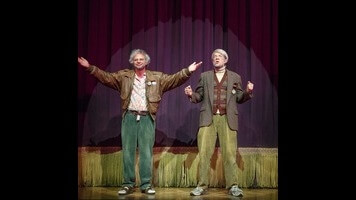Only Nick Kroll and John Mulaney could’ve (or should’ve) come up with Oh, Hello

Gil Faizon (Nick Kroll) and George St. Geegland (John Mulaney) have lived lives far more charmed than their fictional biographies let on. The bespectacled working actor/stand-in model for mashed potatoes and his best friend—a writer whose personal history has significant overlap with those of accused murderers Michael Peterson and Robert Durst—have come far from their origins as Upper West Side caricatures hosting a comedy night in the East Village. They became breakout characters on Kroll’s eponymous Comedy Central sketch show, after which he and Mulaney mounted off-Broadway, touring, and Broadway runs of Oh, Hello, a stage show that inhales deeply from George and Gil’s mountainous reserves of self-aggrandizement, abnormally pointed malice, and penchant for idiosyncratic pronunciation. Or, as they’d probably put it, a “pin-chint” for “idd-yo-syncretic” pronunciation. Across live performances, taped sketches, numerous podcast and talk show appearances, and an in-character New York Times profile they’d brag about loudly enough so everyone in the diner can hear, Kroll and Mulaney have turned the tuna-crusted, Steely Dan-loving equivalents of Statler and Waldorf into darlings of the comedy world. Next stop: A Netflix special recorded during Oh, Hello’s stand at New York’s Lyceum Theater.
Oh, Hello is a unique theatrical experience, captured here for posterity by director Michael John Warren. One part character study, one part live theater criticism, and two parts play-within-a-play, its sense of humor is deeply specific and heavily referential, but it’s also proof that a specific perspective and an alienated audience don’t necessarily go hand in hand. Oh, Hello is the type of show that can get a huge laugh just by painting a picture with words, like George’s description of a “1970s coffee”: “Watery and gray and a gun next to it on the table.”
Besides, George and Gil need no help with alienation. The most remarkable aspect of the duo’s climb to semi-renown is how unrelentingly awful they are, to one another and everyone else in the world. Kroll has described them as “monsters,” and their behavior throughout Oh, Hello is plenty monstrous: They holler at an unseen tech intern, ignore one another’s cries for help, and express an omnidirectional chauvinism that would be empty provocation in clumsier hands. Gil and George’s cruelty and stupidity don’t always have a point, but they do always have a basis in character—characters that Kroll and Mulaney have been honing for more than a decade, filling in their outlines with the codependence and vulnerability they fail to mask with verbal abuse and faux bravado. Take them out of their comedic context, and Gil and George could star in the sort of high-tension stage dramas Oh, Hello parodies during its loudest moments.
Oh, Hello is more than just Gil and George’s basest instincts—it’s also their professional jealousies, their selective memories, their wont for foisting massive deli sandwiches on “unsuspecting” guests. It’s all informed by the stars’ affection for and knowledge of odd cultural corners, like the true-crime obsession that often comes out in Mulaney’s stand-up, or the rat-a-tat Theater 101 class that wends its way through Oh, Hello’s introductory portions. On a set they claim to have cobbled together with cast-offs from a Steel Magnolias revival, an unnamed August Wilson play, and The Cosby Show, Gil and George run through the classics of dramaturgy: The one-sided phone call, yelling, and light-dimming exit lines of “mild significance.” (“You know, looking back, my father was a poor man. But in the end, he gave us the greatest gift of all: a 1997 Toyota Tercel.”) Addressing the Lyceum, the characters identify the Venn diagram of at-home audiences that will keep Oh, Hello On Broadway in heavy rotation: “A collection of comedy nerds, theater dorks, and children whose parents have made a severe miscalculation.” The special will enjoy an unlimited engagement in the corners of high-school drama-club parties where no one is making out, playing to an audience of the tech crew and the four cast members who lobby to do Spamalot every fall. They’ll love it, and they should.
 Keep scrolling for more great stories.
Keep scrolling for more great stories.
